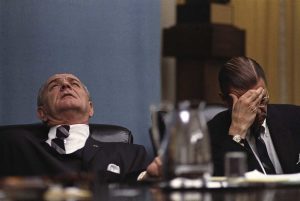
President Lyndon Johnson and Defense Secretary Robert McNamara, 1968
America torn apart by unrest. An overarching issue that has caused the deaths of many thousands of Americans. Separate protests and riots over the death of a black man. It’s a good description of 2020, right? Actually, this also describes the year 1968. There are some striking parallels between these two years, and they do not bode well for Donald Trump or the Republican Party.
In 1968, Lyndon Johnson, who had become president after John F. Kennedy‘s assassination in November 1963, faced the twin issues of the Vietnam War and racial unrest. The war so mired President Johnson and tore apart the country that, in March 1968, Johnson announced that he would not run for reelection. And then, just four days later, as if to ensure that America would remain in strife through the election, black civil rights leader Rev. Martin Luther King, Jr. was assassinated. Coming after years of bloody civil rights battles and documented police brutality, King’s murder led to protests and riots around the country. Johnson’s decision not to run for another term was already based in part in the reality that his approval rating throughout 1968 mostly hovered in the low forties range, having declined steadily from the highs of nearly 80 percent in his first few months after taking office, and was largely attributable to the Vietnam War.
Trump, like Lyndon Johnson, also faces at least two national emergencies, in Trump’s case the Coronavirus (COVID-19) pandemic and the nationwide protests in the aftermath of the police murder of George Floyd. Trump is failing to respond to either emergency. As to the Coronavirus, Trump previously said the pandemic was “a hoax” and that “we’re not a shipping clerk” in response to desperate requests from states for protective and medical equipment such as masks and ventilators. Trump’s inaction has led America to more than 1.8 million confirmed COVID cases and over 107,000 deaths in just a few months, five times the number of U.S. deaths in the Vietnam War from 1956 through March 1968.
As to the protests in the aftermath of the George Floyd murder, last weekend, while Trump called for “MAGA night,” presumably to have armed supporters show up at the White House, instead protesters arrived and Trump cowered in an underground bunker with the White House lights turned off. In contrast, Trump’s 2020 election opponent Joe Biden spent last Sunday meeting with protesters and local business owners face to face, and on Monday Biden met with community leaders at a local church in Delaware. Even Richard Nixon, the Republican who won the 1968 presidential election and inherited the Vietnam War, showed up to meet anti-war protesters face to face at the Lincoln Memorial in 1970. Sadly, Trump’s response to today’s big issues was to sit for a friendly interview with Fox News at the Lincoln Memorial, and to send out false, violence-inciting tweets, causing Twitter to fact check and slap warning labels on Trump.
Moreover, similar to Lyndon Johnson in 1968, Donald Trump’s approval rating is only 43 percent, and, unlike Johnson, Trump’s approval has never even been as high as 50 percent. Not surprisingly, Joe Biden leads Trump in many polls, both on the national level and in certain “battleground” states, most of which Trump won by thin margins in 2016 and which will likely determine the 2020 elections as well. According to political scientist Marcus H. Johnson, Trump’s poll numbers are truly dismal:
I don’t think people are really acknowledging how large Biden’s lead over Trump is. Trump is the worst polling incumbent in 80 years. An incumbent President has never polled as poorly as Trump in an election year. He’s not invincible. In fact he’s very weak. Always was.
— Marcus H. Johnson (@marcushjohnson) June 1, 2020
In 1968, the Republican Party presidential candidate, Nixon, promised that he would restore the torn fabric of America and provide new leadership in the Vietnam War effort. The voters responded, and tossed the incumbent (Democratic) president from the White House. The majority party in the U.S. Senate (again, the Democrats) also lost five seats.
None of this looks good for Donald Trump and the Republican Party in the 2020 elections. For example, the Democrats now need to win only four seats to recapture the U.S. Senate majority, and polls are showing the Democrats with increasingly better odds. Indeed, there are few statements of support for Trump among Republican office holders right now. Instead, groups such as Republican Voters Against Trump have been springing up and running ads, alongside existing groups such as the “Never Trump” Republicans and the Lincoln Project. Most politicians have a sense of self-preservation, and that sense may be causing Republicans to distance themselves from, and ultimately ditch, Trump this year.
Photo by manhhai, used under Creative Commons license. https://is.gd/mrY9Ev


